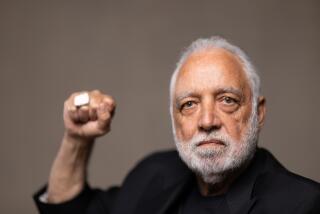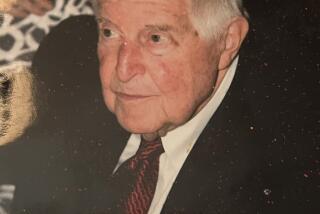Dante Fascell; Led Foreign Affairs Panel in Gulf War
- Share via
Dante B. Fascell, the candid chairman of the House Foreign Affairs Committee during the Gulf War and a staunch advocate of human rights, has died. He was 81.
Fascell, who received the Presidential Medal of Freedom in October, died Saturday of colon cancer at his home in Clearwater, Fla.
The son of Italian immigrants went to Congress as the Democrat representative for Miami in 1954 and took over the foreign affairs post in 1984. He retired in 1992.
The short and portly Fascell was affectionately known for his ability and willingness to cut through foreign policy rhetoric. When colleagues danced around the meaning of ultimatums to Saddam Hussein, Fascell bluntly acknowledged that his committee was authorizing the practical equivalent of a declaration of war.
“Every which way we know of, we need to tell Saddam Hussein directly: ‘This is the limit of what you’re going to be able to do, period. You’re not going to kill any more people,’ ” he said before the Gulf War.
When President Clinton awarded Fascell the Medal of Freedom less than two months ago, he praised the 38-year congressman as “courageous in war and in public service” and said Fascell “has contributed immeasurably to America’s national security, to our leadership in the global economy and to our quality of life.”
The declaration cited Fascell as “a man of reason and of conscience” and noted that he had “demonstrated an unwavering commitment to civil rights, environmental protection and openness in government.”
Internationally, Fascell was known for his work for human rights, including the Helsinki accords, and for arms control.
In Florida, he was revered for his efforts in conservation and preservation, including funding Everglades National Park and the formation of Biscayne National Park, restoring beaches and building bridges in the Keys.
Born on Long Island, N.Y., Fascell’s family moved to Miami when he was 8. He earned a law degree from the University of Miami School of Law and practiced law for three years before entering the Army in World War II. He served in Africa, Sicily and Italy and rose to the rank of captain.
The war experience, he said, persuaded him to go into public service, commenting: “If American men are going to be sent to war, I want to know why and be part of the process that decides whether they should go.”
In the late 1940s, Fascell worked as legal attache to the Dade County state legislators, and in 1950, he earned his own seat in the Florida House of Representatives.
Fascell is survived by his wife of 57 years, Jeanne-Marie; two daughters, Sandra Diamond and Toni Strother, and three grandchildren.
More to Read
Sign up for Essential California
The most important California stories and recommendations in your inbox every morning.
You may occasionally receive promotional content from the Los Angeles Times.












